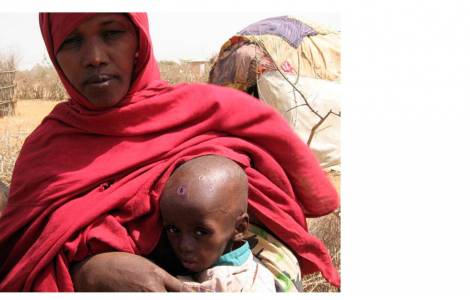
CHS
Gode (Agenzia Fides) - The United Nations estimates that in Ethiopia, between Oromia and the Somali Region, 15 million people are in urgent need of food aid due to drought. 33% of this population is already suffering the effects of severe malnutrition due to agriculture failure and death of livestock. It is estimated that, between October 2015 and April 2016 about 450 000 animals died, severely affecting the supply of milk, especially for children. El Niño has contributed to making matters worse, which threatens to leave 15 million people without water and food. Drought has become endemic and lands are slowly dying.
"The once fertile lands that stretch throughout the Bale region, between Wabe Mena to the town of Mandera and Dolo Ado, are now unusable" a missionary told Fides, engaged for years among these people. "Farmers – he continues - see their crops of papaya, tomatoes, watermelons, potatoes, onions, peppers, cucumbers agonize. Sheep, cows, goats and camels wander aimlessly. There are about 260 families belonging to the Ogaden clan, of Somali origin who have lived all their life in Ethiopia in the Oromia region, in the western end of the River Wabe Gestro and now are experiencing the most severe humanitarian crisis".
"One morning the mayor asked me to accompany him to a meeting. I am the only Christian in an assembly of more than 150 men and women. The mayor tells me: 'Father, we know that you and the Catholic Church are the only ones able to help us in this crisis. Gode was full of internal refugees. These are families fleeing drought and famine. They are hungry, exhausted, terrified'. We chose the most serious cases - says the missionary - and for about 10 days we took them to the clinic of the mission. Along with the director of the World Wide Fund in Gode in a few hours we organized a huge convoy of more than 29 tons of food: rice, oil, soybeans, flour, powdered milk, corn. After providing water, food and medicine I thought of the idea of building a small school currently attended by 170 children and some adults". (AP) (Agenzia Fides 10/05/2016)
